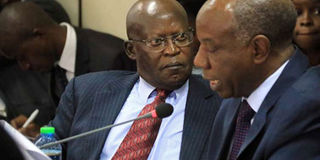Evidence was compromised, says witness in Tunoi case

Suspended Supreme Court Judge Philip Tunoi (left) with his lawyer Fred Ngatia during cross examination of a witness on April 12, 2016 in an ongoing bribery case. A witness told the tribunal that his emails had been corrupted but asked for more time to recover the document. PHOTO | JEFF ANGOTE | NATION MEDIA GROUP
What you need to know:
- Prominent Nairobi businessman Mike Njeru told the tribunal that he had received an email from Mr Geoffrey Kiplagat, the whistleblower, which contained part of the details of his affidavit on January 16, last year.
- Defence lawyer Fred Ngatia said he was trying to establish using a scientific process if the documents received by Mr Njeru tallied with the affidavit signed by Mr Kiplagat.
Justice Philip Tunoi’s defence team on Thursday sought to determine if the testimony given in the form of an affidavit implicating him in an alleged bribery scandal was backdated.
Prominent Nairobi businessman Mike Njeru told the tribunal that he had received an email from Mr Geoffrey Kiplagat, the whistleblower, which contained part of the details of his affidavit on January 16, last year, but then got the full document four days later.
The email read: “Soma nusu I’ll send you the next half kesho” (read that half; I’ll send the rest tomorrow).
Mr Kiplagat’s testimony, which alleges that the suspended Supreme Court judge was given Sh200 million to influence the outcome of an election petition against Nairobi Governor Evans Kidero, is dated November 22, 2014.
Mr Njeru told the tribunal that, until then, he had enjoyed a cordial relationship with Mr Kiplagat and was hence shocked upon receiving the document as it bordered on a threat.
“When I got this email, the first thing I did was call my friend John, who works in the governor’s office,” said Mr Njeru. “I was shocked and perturbed by receiving this doc from Kip, someone I knew very well.”
Defence lawyer Fred Ngatia said he was trying to establish using a scientific process if the documents received by Mr Njeru tallied with the affidavit signed by Mr Kiplagat.
“What I’m trying to establish...if this date, November 22, 2014, is correct...and I want us to do it scientifically, not by faith,” he said.
Mr Ngatia sought to determine the same by highlighting paragraphs, words and pages that did not tally in the two documents.
He labelled the documents, the first email as ‘Document A’ and the second as ‘B’, while the Mr Kiplagat’s affidavit just remained ‘affidavit’.
CORRUPTED EMAILS
Ngatia: Is it possible that a document you have received in the format you explained to the tribunal could be sent and then everything has changed?
Njeru: You can’t do that.
Ngatia: Is it possible, in ‘B’, to change numbering from 20 (paragraphs) to be number 1 as it is in ‘A’?
Njeru: It’s not possible.
Ngatia: It could be possible if this document was in draft, wouldn’t it?
Njeru: Exactly, yes.
The panel asked Mr Ngatia to establish if the document was sent as an attachment in MS Word format or PDF so as to ascertain if it had been altered.
After almost an hour’s recess, which had been intended for 15 minutes, Mr Njeru told the tribunal that his emails had been corrupted but asked for more time to recover the document.
Sittings will resume on May 16.





